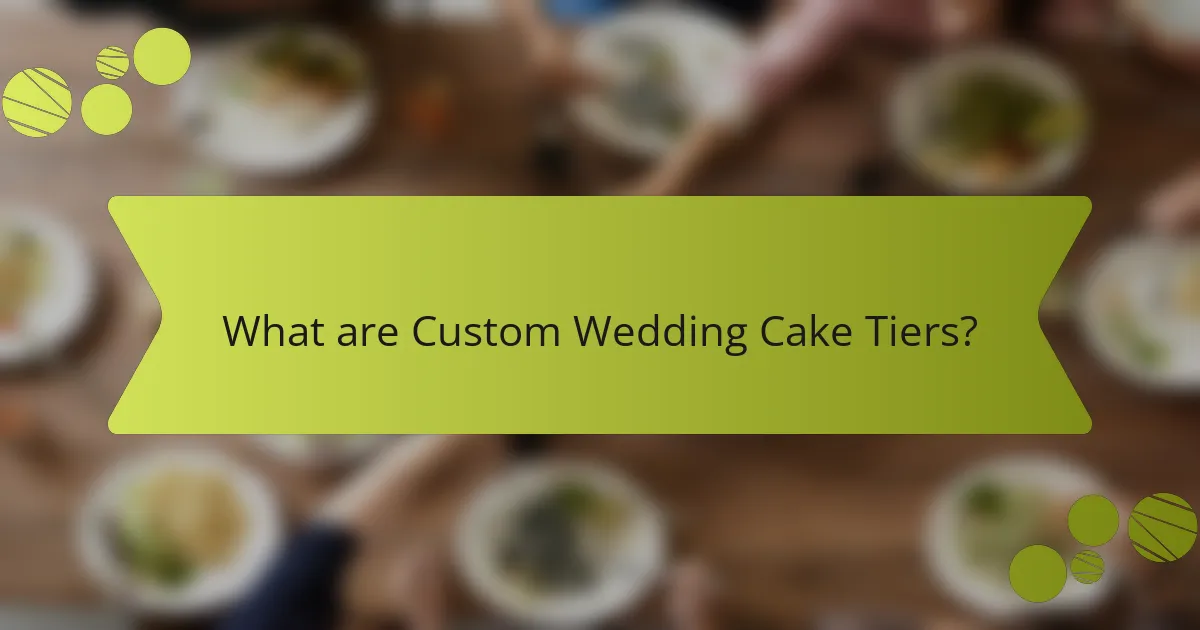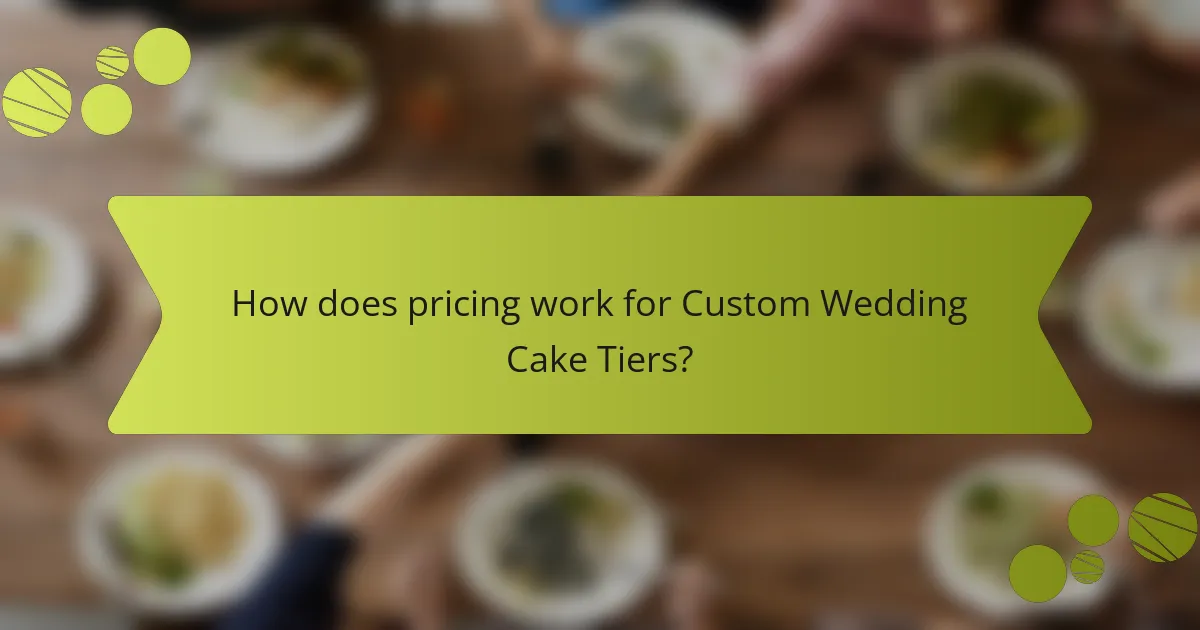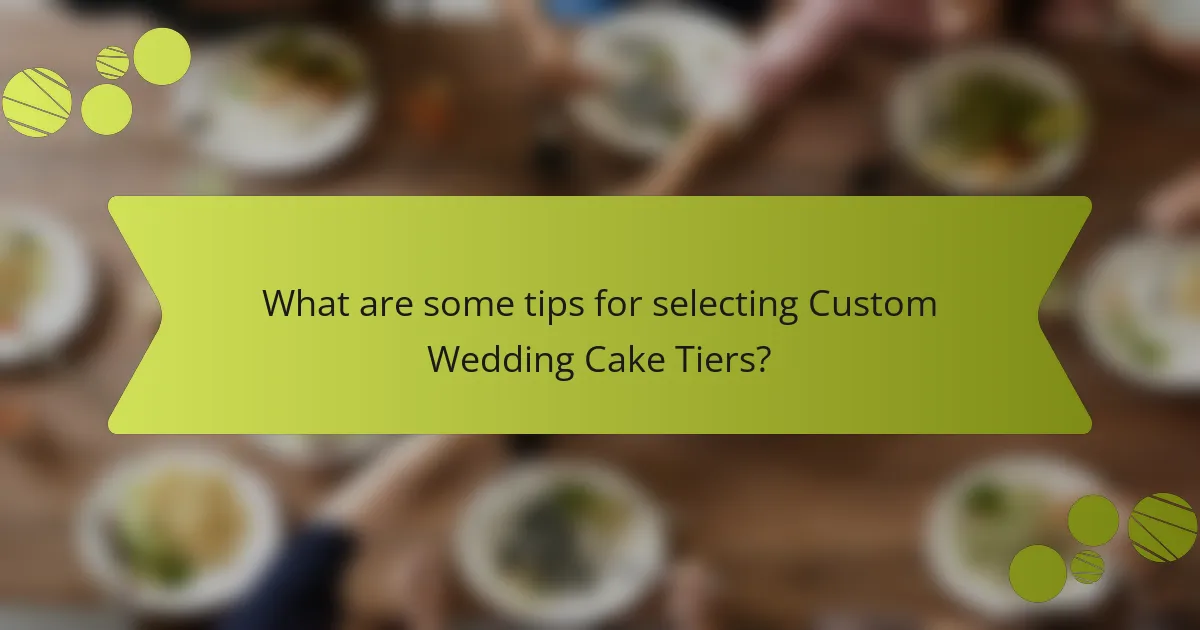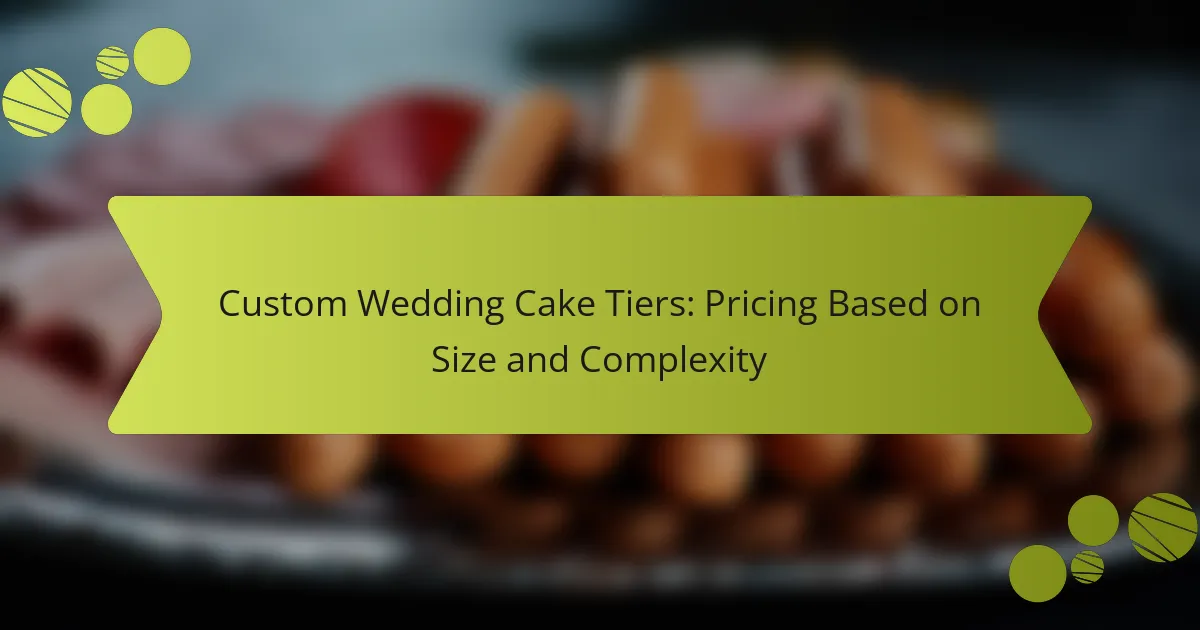Custom wedding cake tiers are individual layers of a wedding cake tailored to specific preferences, allowing couples to reflect their personal taste and wedding theme. Each tier can differ in size, flavor, and design, accommodating diverse dietary needs, such as gluten-free options. The pricing of these custom tiers is influenced by factors like size, complexity of design, and choice of ingredients, typically ranging from $3 to $10 per slice. Couples should consider guest count and overall wedding aesthetics when selecting tier shapes, sizes, and flavors, while also discussing budget and dietary requirements with their baker to ensure a personalized cake that meets their vision.

What are Custom Wedding Cake Tiers?
Custom wedding cake tiers are individual layers of a wedding cake designed to meet specific preferences. Each tier can vary in size, flavor, and design. Customization allows couples to reflect their theme and personal taste. Bakers can create unique shapes, colors, and decorations for each tier. This personalization enhances the overall aesthetic of the wedding cake. Custom tiers can also accommodate different dietary needs. For example, a gluten-free tier can be included alongside traditional options. The pricing of custom wedding cake tiers typically depends on their size and complexity. Larger or more intricate designs usually cost more.
How are Custom Wedding Cake Tiers designed?
Custom wedding cake tiers are designed based on the couple’s preferences, theme, and size requirements. Bakers consider the overall wedding theme to create a cohesive design. They also assess the number of guests to determine the appropriate size and tier count. Each tier can feature different flavors and fillings, catering to varied tastes. Decoration techniques include fondant, buttercream, and edible embellishments. Custom designs may incorporate elements like fresh flowers or intricate piping. The complexity of the design influences pricing, as more detailed work requires additional time and skill. Ultimately, the design process is collaborative, ensuring the cake reflects the couple’s vision.
What factors influence the design of Custom Wedding Cake Tiers?
The design of custom wedding cake tiers is influenced by several key factors. These include the couple’s theme and color scheme, which dictate the overall aesthetic. The number of guests impacts the size and number of tiers required. Flavor preferences also play a role in determining the cake’s structure. Budget constraints can limit design options and materials used. Seasonal availability of ingredients may affect flavor choices and decoration styles. Lastly, the cake designer’s expertise and creativity influence the final design options available to couples.
How do different cake flavors affect the design choices?
Different cake flavors significantly influence design choices. Each flavor can evoke specific themes and color palettes. For instance, chocolate may inspire rich, dark designs, while vanilla often leads to lighter, elegant aesthetics. Fruity flavors like lemon or raspberry encourage vibrant colors and fresh decorations. The choice of flavor can also dictate the type of frosting and fillings used, impacting the overall look. Additionally, some flavors pair better with certain design elements, such as rustic versus modern styles. Ultimately, the flavor selection shapes both the visual appeal and the thematic coherence of the cake design.
Why is size important in Custom Wedding Cake Tiers?
Size is important in custom wedding cake tiers because it directly influences the number of servings. A larger cake can accommodate more guests, ensuring everyone is served. Additionally, size affects the overall visual impact of the cake. A taller cake often creates a more dramatic presentation.
The size also determines the amount of ingredients needed, which impacts pricing. For example, a three-tier cake requires more batter and frosting than a single-tier cake. This increase in materials leads to higher costs.
Moreover, the size of the cake can dictate the complexity of the design. Larger cakes often allow for more intricate decorations and details. This complexity can enhance the cake’s aesthetic appeal and align with the wedding theme.
In summary, the size of custom wedding cake tiers is crucial for serving capacity, visual presentation, ingredient costs, and design complexity.
What are the standard sizes for Custom Wedding Cake Tiers?
The standard sizes for custom wedding cake tiers typically include 6-inch, 8-inch, 10-inch, and 12-inch diameters. These sizes are commonly used in tiered wedding cakes. A 6-inch tier usually serves about 10-12 guests. An 8-inch tier can serve around 20-24 guests. A 10-inch tier typically serves 30-36 guests. Lastly, a 12-inch tier can serve approximately 40-48 guests. These dimensions help bakers and couples estimate servings accurately. The sizes are also designed to stack well, ensuring stability and aesthetic appeal.
How does the number of guests impact the size of the cake?
The number of guests directly impacts the size of the cake. A larger guest count requires a bigger cake to ensure everyone receives a slice. Typically, a standard serving size for cake is about 1 inch by 2 inches. For example, a cake serving 50 guests would need to be approximately 6 to 8 inches in height and 10 to 12 inches in diameter. Conversely, a smaller guest list of 20 might only need a cake that is 6 inches in diameter. Bakeries often calculate cake size based on guest count to avoid shortages. This ensures that all guests are satisfied during the event.
What complexities are involved in Custom Wedding Cake Tiers?
Custom wedding cake tiers involve several complexities. These include structural integrity, flavor combinations, and design intricacies. Each tier must support the weight of the tiers above it. This requires careful planning of materials and support systems. Flavor combinations can complicate the baking process. Different flavors may require different baking times and temperatures. Design intricacies include the choice of decorations and finishes. Unique designs can increase preparation time and skill level required. Additionally, the size of the cake influences the complexity. Larger cakes often require more detailed planning and execution. These factors collectively contribute to the overall complexity of custom wedding cake tiers.
What intricate designs can be incorporated into Custom Wedding Cake Tiers?
Custom wedding cake tiers can feature intricate designs such as lace patterns, floral embellishments, and geometric shapes. Lace patterns can mimic delicate fabric, adding elegance to the cake. Floral embellishments can include sugar flowers, which are handcrafted for realism. Geometric shapes offer a modern touch, creating visual interest. Other designs may incorporate hand-painted details or metallic accents for added sophistication. Textured finishes, like ruffles or quilted patterns, enhance the overall aesthetic. Each design choice contributes to the cake’s uniqueness and aligns with the couple’s theme. Customization options are virtually limitless, allowing for personal expression in every tier.
How do custom decorations affect the complexity of the cake?
Custom decorations increase the complexity of the cake. They require additional skills and time for preparation. Intricate designs often involve multiple layers and techniques. Each custom element adds to the overall labor involved. For example, hand-piped details or sugar flowers demand precision. More decorations can also affect the structural integrity of the cake. This complexity often leads to higher costs due to the increased effort and materials required. Therefore, custom decorations are a significant factor in determining cake complexity.

How does pricing work for Custom Wedding Cake Tiers?
Pricing for custom wedding cake tiers is determined by several factors. The size of the cake significantly impacts the cost. Larger cakes require more ingredients and labor, thus increasing the price. The complexity of the design also plays a crucial role. Intricate designs demand more time and skill, leading to higher prices. Additionally, the choice of flavors and fillings can affect pricing. Premium ingredients generally raise the overall cost. Bakers may also charge for custom decorations or unique features. On average, wedding cakes range from $3 to $10 per slice, depending on these factors. This pricing structure reflects the craftsmanship and personalization involved in creating custom wedding cakes.
What are the main factors that determine the price of Custom Wedding Cake Tiers?
The main factors that determine the price of custom wedding cake tiers include size, complexity, ingredients, and design. Size directly impacts the amount of cake required. Larger cakes necessitate more ingredients and labor, raising costs. Complexity involves the intricacy of the design and decoration. More detailed designs require skilled labor and additional time, increasing the price. Ingredient quality also influences cost; premium ingredients lead to higher prices. Lastly, customization options such as flavors and fillings can affect overall pricing. Each of these factors contributes significantly to the final cost of a custom wedding cake tier.
How does size affect the overall cost of the cake?
The size of a cake directly influences its overall cost. Larger cakes require more ingredients, which increases material costs. Additionally, bigger cakes demand more time for baking and decorating, adding to labor expenses. For example, a standard cake serving 50 people may cost $300, while a cake for 100 people could cost $600. This pricing reflects the increased volume of ingredients and the complexity of decoration. Therefore, as size increases, the cost typically rises proportionally due to these factors.
What role does complexity play in pricing?
Complexity significantly influences pricing in custom wedding cakes. Higher complexity often results in increased labor and material costs. Detailed designs and intricate decorations require more time and skill from bakers. For example, a cake with multiple tiers and elaborate fondant work costs more than a simple one-tier cake. Additionally, complex cakes may need specialized ingredients, which can also raise the price. According to industry standards, intricate designs can increase cake costs by 20% to 50%. Thus, complexity directly correlates with the final price of a custom wedding cake.
What are the average price ranges for Custom Wedding Cake Tiers?
The average price ranges for custom wedding cake tiers typically fall between $3 to $15 per slice. This pricing can vary based on factors such as size, complexity, and design. For a standard three-tier wedding cake, the total cost can range from $300 to $1,200. Cakes with intricate designs or specialty flavors may command higher prices. Customization, such as personalized decorations, can also increase costs. According to industry reports, the average price per slice has risen in recent years, reflecting trends in gourmet ingredients and artistic presentation.
How do prices vary based on different regions or markets?
Prices for custom wedding cake tiers vary significantly based on region and market. Urban areas typically have higher costs due to increased demand and overhead. For instance, cities like New York or Los Angeles often charge 20-30% more than rural areas. Additionally, local ingredients and labor costs influence pricing. Regions with access to premium ingredients may see higher prices. Market competition also plays a role; areas with many bakeries may offer lower prices. Conversely, exclusive markets may charge a premium for unique designs. Seasonal trends can further affect prices, with peak wedding seasons leading to higher rates. Overall, regional economics and market dynamics directly impact the pricing of custom wedding cake tiers.
What additional costs should be considered when budgeting for a wedding cake?
When budgeting for a wedding cake, additional costs include delivery fees, setup charges, and taxes. Delivery fees can range from $30 to $100 depending on the distance from the bakery to the venue. Setup charges may apply if the cake requires special assembly or decoration on-site. Taxes are often calculated based on the total cake price and can vary by location. Specialty flavors or custom designs typically incur extra charges, increasing the overall cost. Lastly, a deposit is often required to secure the order, which is an upfront cost that should be factored into the budget.

What are some tips for selecting Custom Wedding Cake Tiers?
Select custom wedding cake tiers based on guest count and design preferences. Determine the number of servings needed for your event. A general guideline is to allocate one slice per guest. Consider the overall theme and aesthetic of your wedding. Choose tier shapes and sizes that complement your venue and decor. Explore flavor options for each tier to cater to diverse tastes. Discuss your budget with your baker to align on size and complexity. Custom cakes can vary widely in cost based on design intricacies. Ensure to communicate any specific dietary needs to your cake designer.
How can couples choose the right size and complexity for their wedding cake?
Couples can choose the right size and complexity for their wedding cake by considering guest count and design preferences. The general guideline is to allocate one slice per guest, ensuring there is enough cake. For example, a 6-inch tier typically serves about 12 people, while a 10-inch tier serves around 30.
Complexity should align with the couple’s theme and budget. Simple designs, like a smooth finish, are more cost-effective. Intricate designs, such as fondant decorations or multiple tiers, increase complexity and price. Couples should also discuss their vision with a baker, who can provide insights on feasible designs within their budget.
Ultimately, balancing guest needs with personal style will guide couples in selecting the appropriate size and complexity for their wedding cake.
What common mistakes should be avoided when selecting a wedding cake?
Common mistakes to avoid when selecting a wedding cake include not considering guest count. It’s essential to choose a cake size that accommodates all guests. Failing to sample flavors can lead to disappointment on the wedding day. Not setting a budget upfront may result in overspending. Ignoring dietary restrictions of guests can exclude some from enjoying the cake. Selecting a design that is too complex can increase costs significantly. Lastly, not booking a baker in advance can limit options and availability.
How can couples balance their budget with their cake desires?
Couples can balance their budget with their cake desires by prioritizing their needs and exploring cost-effective options. Setting a clear budget for the cake is essential. Researching local bakeries and comparing prices helps identify affordable choices. Couples can also consider smaller cake tiers for decoration and supplement with sheet cakes for serving. Choosing simpler designs or flavors can reduce costs without sacrificing quality. Additionally, discussing budget constraints with the baker can lead to tailored solutions. Many bakers offer package deals that may include discounts for larger orders.
What are best practices for ordering Custom Wedding Cake Tiers?
To order custom wedding cake tiers effectively, start by determining the number of guests. A general guideline is to allocate one slice per guest. Next, select the desired flavors and fillings. Popular choices include vanilla, chocolate, and red velvet. Consider the cake’s design and theme to ensure it complements the wedding’s aesthetic.
Discuss the size and shape of each tier with the baker. Standard tiers are usually round, but square and hexagonal options are available. Provide the baker with a clear vision or inspiration images to facilitate the design process.
Order the cake well in advance, ideally three to six months before the wedding. This timeframe allows for proper planning and adjustments. Confirm delivery details, including the setup time and location, to avoid last-minute issues.
Lastly, review the contract carefully. Ensure all details, including pricing based on size and complexity, are accurately documented. This practice minimizes misunderstandings and ensures a smooth experience on the wedding day.
How far in advance should couples place their cake orders?
Couples should place their cake orders at least three to six months in advance. This timeframe allows bakers to accommodate design requests and ensure ingredient availability. Many popular bakeries book up quickly, especially during peak wedding seasons. Ordering early also provides time for tastings and adjustments to the cake design. Additionally, some bakers may require deposits or have specific deadlines for custom orders. Planning ahead can help avoid last-minute stress and ensure a smooth experience.
What questions should couples ask their cake designer?
Couples should ask their cake designer about flavor options, design capabilities, and pricing structure. They should inquire about the ingredients used, including any allergens. Couples must also confirm the designer’s availability for their wedding date. It is essential to discuss the number of servings needed for guests. Understanding the delivery and setup process is crucial as well. Couples should ask about the timeline for ordering and any necessary deposits. They should also inquire about tasting sessions and customization options. Lastly, asking for references or reviews can help gauge the designer’s reliability and quality.
Custom wedding cake tiers are distinct layers of a wedding cake tailored to individual preferences, varying in size, flavor, and design. This article provides an in-depth overview of the factors influencing the design and pricing of custom wedding cake tiers, including the impact of size, complexity, and ingredient quality. It also addresses the importance of accommodating dietary needs and the collaborative design process between couples and bakers. Additionally, pricing structures based on tier sizes and intricate designs are examined, along with best practices for ordering and common mistakes to avoid when selecting a wedding cake.
